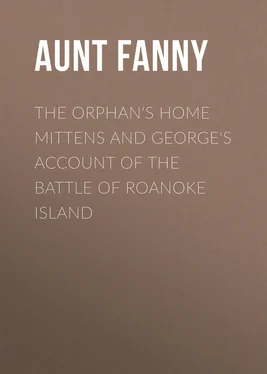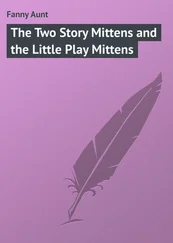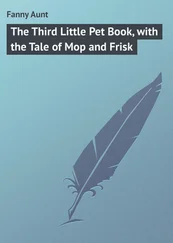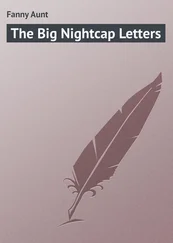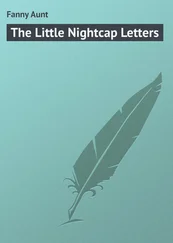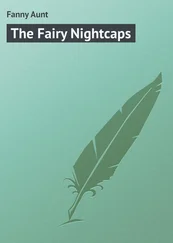Aunt Fanny - The Orphan's Home Mittens and George's Account of the Battle of Roanoke Island
Здесь есть возможность читать онлайн «Aunt Fanny - The Orphan's Home Mittens and George's Account of the Battle of Roanoke Island» — ознакомительный отрывок электронной книги совершенно бесплатно, а после прочтения отрывка купить полную версию. В некоторых случаях можно слушать аудио, скачать через торрент в формате fb2 и присутствует краткое содержание. ISBN: , Издательство: Иностранный паблик, Жанр: foreign_prose, на английском языке. Описание произведения, (предисловие) а так же отзывы посетителей доступны на портале библиотеки ЛибКат.
- Название:The Orphan's Home Mittens and George's Account of the Battle of Roanoke Island
- Автор:
- Издательство:Иностранный паблик
- Жанр:
- Год:неизвестен
- ISBN:http://www.gutenberg.org/ebooks/48608
- Рейтинг книги:3 / 5. Голосов: 1
-
Избранное:Добавить в избранное
- Отзывы:
-
Ваша оценка:
- 60
- 1
- 2
- 3
- 4
- 5
The Orphan's Home Mittens and George's Account of the Battle of Roanoke Island: краткое содержание, описание и аннотация
Предлагаем к чтению аннотацию, описание, краткое содержание или предисловие (зависит от того, что написал сам автор книги «The Orphan's Home Mittens and George's Account of the Battle of Roanoke Island»). Если вы не нашли необходимую информацию о книге — напишите в комментариях, мы постараемся отыскать её.
The Orphan's Home Mittens and George's Account of the Battle of Roanoke Island — читать онлайн ознакомительный отрывок
Ниже представлен текст книги, разбитый по страницам. Система сохранения места последней прочитанной страницы, позволяет с удобством читать онлайн бесплатно книгу «The Orphan's Home Mittens and George's Account of the Battle of Roanoke Island», без необходимости каждый раз заново искать на чём Вы остановились. Поставьте закладку, и сможете в любой момент перейти на страницу, на которой закончили чтение.
Интервал:
Закладка:
Frances Elizabeth Barrow
The Orphan's Home Mittens and George's Account of the Battle of Roanoke Island
THE ORPHAN'S HOME
It was now the second week in January, 1862. One evening, Aunt Fanny came to see the children. In an instant, she was surrounded, and hugged, and squeezed, and kissed, till she was certain they had loved a pound or two off her weight; but then they put it on again before she left, by making her laugh so at their capers and talk, that she said she thought she could feel the fat growing; so that made it all square and comfortable.
"I read such a charming little poem in the 'Independent' some weeks ago," said Aunt Fanny.
"Tell it to us! we want to hear it!" cried the children.
"How do you suppose I can remember seven long verses? I do recollect one or two, but that is because I suspect the writer had you children in his eye when he wrote them.
"Oh, Aunt Fanny!" said little Willie, in a reproachful tone, "we didn't get into the poor man's eye. You ought to be ashamed to tell such a story!"
Such shouts of laughter greeted this speech, that an old lady next door, hearing them through the walls, and thinking they were cheers, put on her spectacles, and hobbled to the window, expecting to see a torchlight procession – but poor little Willie, after wondering a moment, with his mouth wide open, what it all meant, rushed up to his mother, and hiding his face in her lap, began to cry.
"Never mind, dear," she said, kissing him; "Aunt Fanny meant that the man was thinking about you when he wrote the poetry. Of course, she knows my little Willie wouldn't poke through anybody's eye, to see what he had behind it. Aunt Fanny made use of what is called a 'figure of speech.' Don't cry any more."
Then all the children coaxed him, and kissed him, and made the kitten Mary O'Reilly kiss him, at which he burst out laughing, and felt quite happy again.
The crochet needles twinkled and twitched faster than ever, as Aunt Fanny repeated these lines:
"Knit – knit – knit —
If you've patriot blood in your veins!
Knit – knit – knit —
For our boys on Southern plains.
Our boys on Southern hills,
Our boys on Southern vales,
By the woods and streams of Dixie's Land,
Are feeling the wintry gales.
"Knit – knit – knit —
The socks, and mittens, and gloves!
Knit – knit – knit —
Each one that her country loves!
The mittens with finger and thumb complete,
The gloves for the drummers their drums to beat,
And the nice warm socks for the shivering feet,
Knit – knit – knit!"
"Is that all you can remember? Oh, how good it is!" cried the children.
"Suppose I make a verse?" said the little mother.
"Oh, do! do! they all entreated.
"Well, here it is:
"And if you can't knit – crochèt! 1 1 Pronounced croshày.
The mittens with finger and thumb,
The old ones can finish a pair in a day,
And the children each make one.
For George, and his comrades brave,
Who have gone our country to save,
Will work heart and hand, till we make Dixie's land
Repent for her sins, and behave!"
The children thought this a capital verse, and Johnny came very near exclaiming, "Bully for you." Very luckily, he recollected himself in time, for his mother would have sent him to bed in "double quick," if he had uttered this vulgar, slang expression.
"I had a talk with my ten naughty boys today," said Aunt Fanny.
"Why, where in the world did you find so many together?" cried Harry. Who ever heard of such a quantity of bad children in a bunch?
"I ought to have said," she answered, "that they were reported to me some time ago, as being very bad; but I did not find them so dreadful as I expected; besides which, my heart softened to them, and I made excuses for them to myself, because they are all orphans."
"Then it must have been at the Orphan's Home," cried the children, for they knew Aunt Fanny was one of the managers.
"Yes, it was there; and I believe I will write a little history of how there came to be this Home for Orphans; and you can work it up in your mittens."
"Oh, yes, do! how long will it take you? We'll write to George that these mittens have listened, with their fingers and thumbs for ears, to your "Orphan's Home" story. They will be the most interesting mittens of all: more so, than those we got by our little play."
The children wished George had ears a hundred miles long, so he could hear all these wonderful and charming stories too; but as they did not know of any cornfield where such long ears were to be found, they had to take it out in wishing; and thinking what a hundred thousand pities it was that the fairies had all gone to No Man's Land, or they would have had a fine, long pair of ears for George's use, marching to Washington, straight through Baltimore, without stopping to inquire whether they might come.
Soon after, Aunt Fanny went home. She had been very busy the latter part of the month of December, writing letters for the "Great Union Fair," which had been held in the city. All her letters were to children. I wonder if the children who got these letters, suspected who wrote them. I wonder if the little one who got this "poetry letter," tried to find Aunt Fanny out.
"You precious little darling!
I'm very glad you've come;
How did you leave the baby,
And all the folks at home?
Just take a look around you,
At the pretty things you see;
Then run up to my table,
And give a kiss to me."
Aunt Fanny could not send the promised story until the last week in January: but when it came, there was great rejoicing; and the children settled themselves quicker than ever they did before, to hear the interesting account of
"And whoso shall receive one such little child in my name, receiveth me." – Matthew xviii. 5.
Darling Children:
As I sat here thinking how to begin my story of the "Orphan's Home," our Saviour's beautiful parable of "the grain of mustard seed" came into my mind; and that you may see how well it applies to what I am about to relate, I will copy it here.
"Another parable put he forth unto them, saying:
"The kingdom of heaven is like to a grain of mustard seed, which a man took and sowed in his field:
"Which, indeed, is the least of all seeds; but when it is grown, it is the greatest among herbs; and becometh a tree, so that the birds of the air come and lodge in the branches thereof."
Just like a grain of mustard seed did this great charity begin.
More than ten years ago, a poor man lay in a miserable bed, dying. His little children were weeping at his bedside, for their mother had gone to heaven long before; and they did not know who to look to for food and shelter, when they should be orphans.
"Oh, that I could take you with me, my poor little children!" moaned the dying father.
Just then a lady entered the room. She had accidentally heard of the man who had been ill so long, and she had come in to help him.
She spoke to him in a voice of so much kindness, that he started up, crying, "Oh, madam! I want nothing for myself! but I would get on my knees to you for my children. I cannot die peacefully, thinking of the poverty and dreadful temptations to which they will be exposed. Left alone, orphans and penniless, who is to teach them the way to heaven?"
"Take comfort, my poor friend," said the kind lady, "your children shall not suffer want."
"But will they be taught to know and love their Saviour?" he asked, looking at her with an expression of intense anxiety.
"Yes, I will see that they are religiously brought up."
Читать дальшеИнтервал:
Закладка:
Похожие книги на «The Orphan's Home Mittens and George's Account of the Battle of Roanoke Island»
Представляем Вашему вниманию похожие книги на «The Orphan's Home Mittens and George's Account of the Battle of Roanoke Island» списком для выбора. Мы отобрали схожую по названию и смыслу литературу в надежде предоставить читателям больше вариантов отыскать новые, интересные, ещё непрочитанные произведения.
Обсуждение, отзывы о книге «The Orphan's Home Mittens and George's Account of the Battle of Roanoke Island» и просто собственные мнения читателей. Оставьте ваши комментарии, напишите, что Вы думаете о произведении, его смысле или главных героях. Укажите что конкретно понравилось, а что нет, и почему Вы так считаете.
